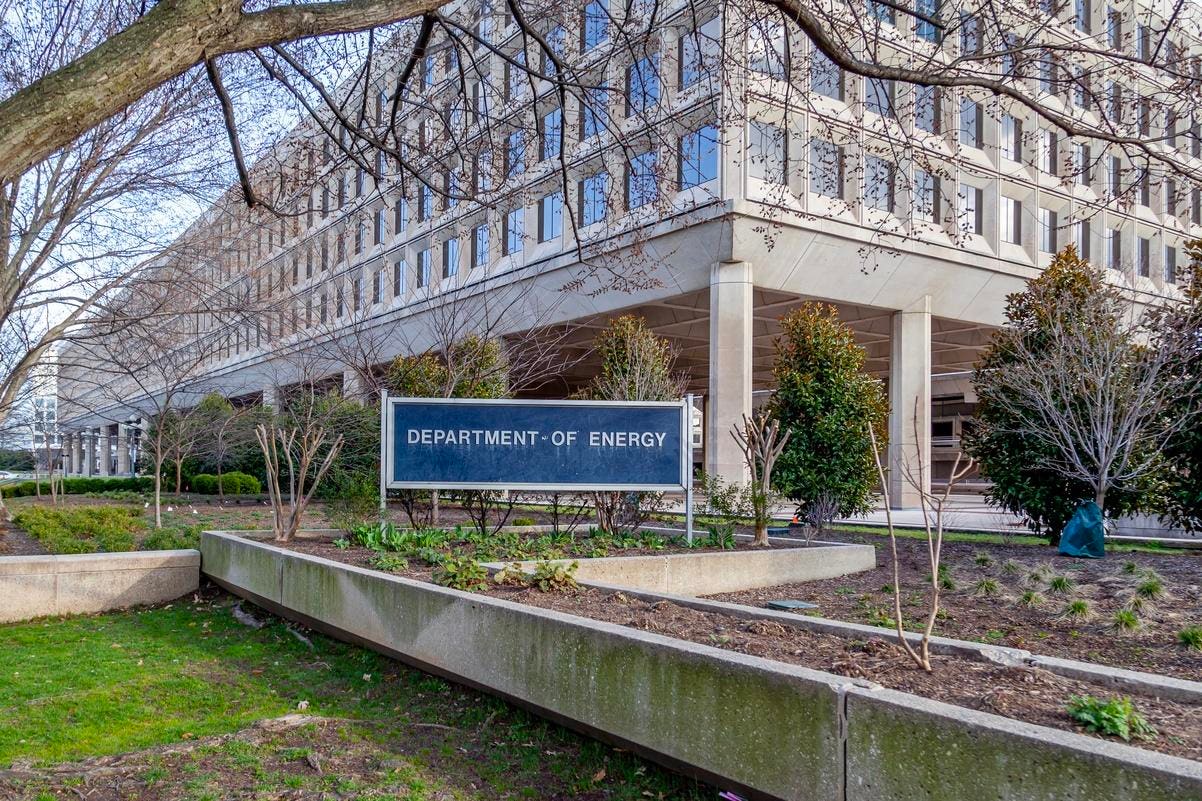U.S. Department of Energy headquarters building in Washington, D.C.
getty
The U.S. government continues to fast-track the private sector’s role in commercializing nuclear fuel after recently selecting four companies to pilot a domestic nuclear fuel supply chain.
The Nuclear Regulatory Commission took another step to advance U.S. private industry production for nuclear fuel. The agency issued an Oct. 23 Federal Register notice seeking public comments on its draft environmental impact statement regarding a proposed TRISO–X LLC fuel fabrication facility on a 110-acre site at the Horizon Center in Oak Ridge in Tennessee.
TRISO–X, a wholly-owned subsidiary of X-energy Reactor Co. LLC, is seeking a special nuclear material license from the NRC to operate the nation’s first High-Assay, Low-Enriched Uranium (HALEU) fuel fabrication facility called TX-1.
On Sept. 30 the U.S. Department of Energy announced it had selected the following four companies for its nuclear Fuel Line Pilot Projects:
- Oklo Inc. of California—to build and operate three fuel-fabrication facilities for advanced reactors
- Terrestrial Energy Inc. LLC of North Carolina—to develop a fuel line assembly to demonstrate a fuel salt fabrication process.
- Valar Atomics Inc. of California—to support TRISO fuel fabrication for the ultra-low power Ward250 reactor and possibly other high-temperature gas reactors. The Ward250 operates under 250 kilowatts with a 30 effective full power day range.
- Tennessee-based TRISO-X—to build/operate an additional fuel fabrication facility to pilot processes for integrating, training and validating to support commercializing TX-1 fuel fabrication.
The NRC is in the process of granting TRISO-X a 40-year license to have and use special nuclear material at a fuel manufacturing facility. Public comments are due Nov. 17.
According to the NRC, the TX-1 plant would make “tri-structural isotropic–based coated particles and final fuel forms using uranium enriched to less than 20 weight percent uranium-235.” Both issuing the license to have and make this type of nuclear fuel would be the first time the U.S. government allowed this kind of domestic supply chain operation.
HALEU reguli fabricated from downblended high-enriched uranium recovered from legacy EBR-II fuel at Idaho National Laboratory.
Idaho National Laboratory.
Texas Gulf Coast to Receive First Batch of HALEU Fuel
In August, TRISO-X and its parent announced the award of a $48.2 million construction contract for TX-1 to produce the first commercial batch of X-energy’s proprietary tristructural-isotropic fuel with the Dow Chemical Co. on the Texas Gulf Coast.
“X-energy is advancing its initial Xe-100 plant at Dow Inc.’s UCC Seadrift Operations manufacturing site on the Texas Gulf Coast. Once complete, the plant is expected to provide the site with safe, reliable, and clean power and industrial steam,” according to an Aug. 5 joint statement from TRISO-X/X-energy Reactor.
Once licensed to operate by the NRC, the TX-1 facility would be able to produce 5 metric tons of uranium to power up to 11 of the parent company’s Xe-100 reactors. Each Xe-100 is an 80 megawatt electrical reactor that can be combined into a four-pack with a total 320 MWe output.
Second Nuclear Fuel Plant Venture with Amazon
TX-1 is the first of two planned facilities at X-energy’s site in Oak Ridge that will manufacture HALEU fuel.
“X-energy is also advancing its second plant with Energy Northwest in collaboration with Amazon,” the joint statement noted. “This project is part of a larger strategy with Amazon to bring more than five gigawatts of new power projects online by 2039, furthering the company’s mission to provide scalable, secure, clean energy solutions that meet the growing demand for energy across the U.S. and around the world.”
Federal Government Accelerating Nuclear Energy at Rapid Pace
THETA Core for Configuration 6- showing the fuel, stainless steel, polyethylene, and borated polyethylene representing a key transportation scenario for TRISO fuel.
U.S. Department of Energy
Both the DOE and NRC are working together to streamline efficiencies that support commercialization of nuclear energy to bring more electricity to the grid. Reasons for the push are due to growing energy needs by AI and data centers as well as efforts by the Trump administration to decrease reliance on foreign countries in critical national sectors such as energy.
“President Trump has made clear that a strong nuclear sector is a central component of America’s energy security and prosperity,” Deputy Energy Secretary James P. Danly said in DOE’s announcement. “Restoring a secure domestic fuel supply will ensure that advanced reactors can move quickly from design to deployment and into operation. The ability to produce these fuels is essential to ensuring American leadership in nuclear energy and to meeting the nation’s growing demand for reliable power.”









